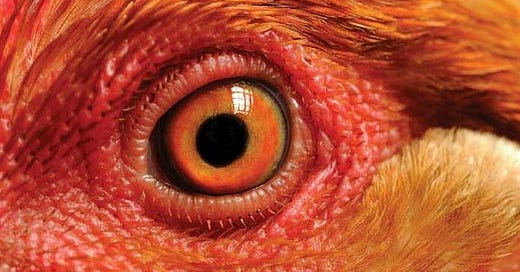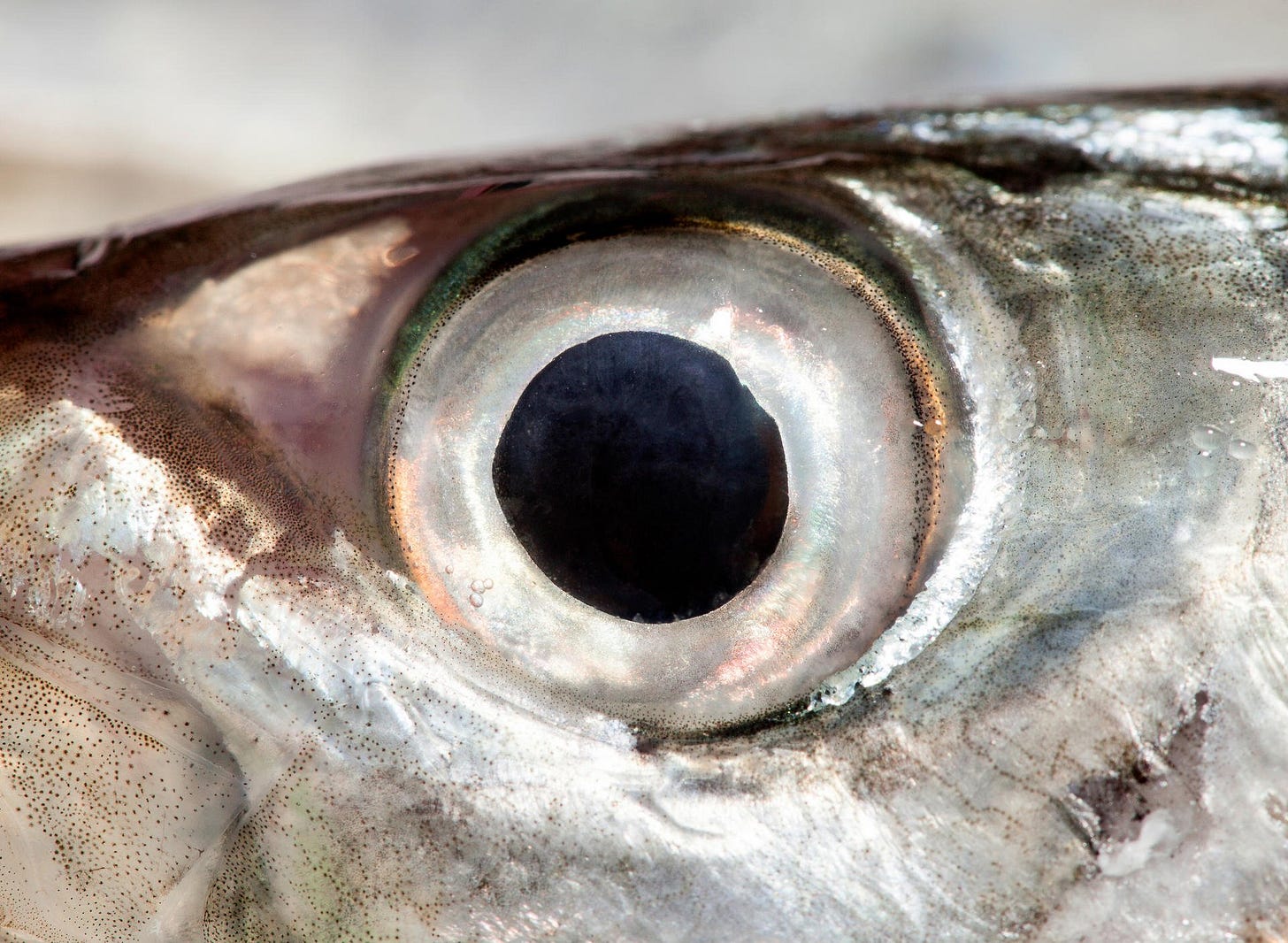A few weeks ago, I wrote an essay about why I’m not a Christian. Part of my essay involved pointing to lines from Jesus that struck me as weird and implausible. One of those passages was Matthew 6:22-23:
22“The eye is the lamp of the body. If your eyes are healthy, c your whole body will be full of light. 23But if your eyes are unhealthy, d your whole body will be full of darkness. If then the light within you is darkness, how great is that darkness!
I naively assumed that this was providing some kind of primitive medical teaching. It certainly didn’t seem very profound. But as others—especially Aron Wall, author of maybe the best blog on the internet—have pointed out to me, this is not how scholars interpreted the passage. It would be pretty weird if Jesus injected random medical advice into a sermon about ethics. The fact that a teaching seems weird to me after two seconds of reflection, when I read it 2,000 years after it was uttered isn’t good evidence that it’s in error!
Reflecting more on the passage, however, along with listening to a talk from Father John Bethancourt—whom Aron once described as “the most visibly holy person I have ever met on this earth”—I’ve become convinced that this passage is deceptively wise. Thinking hard about the passage can lead to both profound realization and significant shifts in one’s thinking.
Probably the most profound illusion under which we normally operate is that we do not take seriously the wonder of other people. While we accurately see great value in ourselves, we remain blind to similar value in others.
We interact with other people, treating them as drab automata. It’s not uncommon for people on the internet to declare others NPCs. But no people are drab nor NPCs. They have a rich, complex inner life—there’s something it’s like to be them. No doubt if you read their mind, you could learn a great deal from them and you’d see them as being just as deep as they see themselves.
Consciousness is the most wonderful and mysterious thing in the universe. Of all of God’s creations, it is the grandest. Indeed, it is needed for most of the others to have value. Beautiful nature, never appreciated, is of no value. The boring people you interact with at work have interests that matter just as much as your own. While we all regard our own interests as deeply important, we rarely take seriously others’ interests.
In our interactions with other people, we are like a small child who glimpses the grand canyon only to declare it boring next to the trains he is playing with. We are like a child who hears their grandfather died, who cannot understand the horror of death, whose only takeaway is that his grandfather will no longer take him to preschool. While we are tiny specks against the grandeur of the universe, all the value in our galaxy is located on Earth.
In short, we have eyes that do not see and ears that do not hear. While other people are “full of light”—wonderful, grand, and of incalculable value—our perception of them is shrouded in darkness. The importance that we sometimes glimpse in friends, family, and cute small children is present in everyone; in most cases, however, it is invisible to us. The most important fact about other people—their importance, their light—remains clouded to us.
We’re especially blind to the importance of others when viewed in the full radiance that will be displayed by their eternal existence. As C.S. Lewis writes in The Weight of Glory:
“It is a serious thing to live in a society of possible gods and goddesses, to remember that the dullest most uninteresting person you can talk to may one day be a creature which, if you saw it now, you would be strongly tempted to worship, or else a horror and a corruption such as you now meet, if at all, only in a nightmare. All day long we are, in some degree helping each other to one or the other of these destinations. It is in the light of these overwhelming possibilities, it is with the awe and the circumspection proper to them, that we should conduct all of our dealings with one another, all friendships, all loves, all play, all politics. There are no ordinary people. You have never talked to a mere mortal. Nations, cultures, arts, civilizations - these are mortal, and their life is to ours as the life of a gnat. But it is immortals whom we joke with, work with, marry, snub, and exploit - immortal horrors or everlasting splendors.”
In our beatified afterlife state, we will be smarter, wiser, more just, and more temperate than we could possibly remember. The present gap between you and the most wicked fool you’ve ever met is infinitesimal compared to the gap between your present state and their beatified state. Nick Bostrom once said of AI “we are like small children playing with a bomb.” This is what we are like in our interactions with other people—it is like we have met young children, destined to become gods.
The person you mocked, bullied, and belittled is to become a god one day. The only reason your belittling was carried out—the only reason it was even thinkable—is because your eyes were clouded in darkness. You couldn’t see the boundless importance of the one you mocked. Most evil acts can only be performed because the one performing them fails to recognize the goodness and the importance of those harmed through the evil acts. If Bundy had valued others equally to himself, he would not have killed those he did.
More directly, if you could “see” how much the children in distant lands wasting away from horrible diseases matter—if you knew their preciousness as you know the preciousness of your own child—you would give away nearly all of your money to effective charities. If you could see vividly how important the life was of the cow, tortured and murdered so that you could eat her flesh, you would not eat her.
Having functional eyes that can see the light in others isn’t just good for others—it’s good for you. You will be slower to anger, deeper in friendship and loving, and more satisfied with others if you see them as beings of inestimable value, rather than mere means towards your edification. Just as one who can appreciate good art will have a better time at an art exhibit than one who can’t, one who can vividly see the good in others will have a better time interacting with others.
This does not just apply to humans. Vividly appreciating the beauty of nature and non-human animals makes life quite a bit more pleasant. Coming to see the world’s beauty as being of God allows one both to have far deeper aesthetic experiences and to forge a deeper connection with God through those aesthetic experiences. If each leaf you see carries the signature of an infinite and perfect God, even an ordinary trip outside will be a profound experience. When one comes to see that all things carry the divine signature, their “whole body will be full of light.”
Then there is, of course, the one most worthy of veneration: God himself!
It is with relation to God that our eyes most profoundly do not see, that our world is most shrouded with darkness. If we could really see vividly the awesome glory of God, we would see our life the way one might see the day before their marriage. An unimaginably awesome future awaits us—one so grand that even a millisecond of it blows all earthly pleasures completely out of the water. The greatness of God is something we cannot grasp intuitively; only mystics seem to have any inkling of it.
Imagine the feeling of dread you would have if you knew you would be tortured tomorrow in the most hideous ways imaginable. If there is a God, our feelings should be precisely the inverse of this. Our anticipation and excitement should far surpass what our dread would be if we knew torture awaited—for the future that awaits us outclasses the horror of torture as thoroughly as true love surpasses a stubbed toe.
If one were to truly internalize this, their “whole body will be full of light.”
There is at least one other sense in which the eye is the lamp of the body. Almost everyone has beautiful eyes. By looking into a person’s eyes, you can see them deeply. People don’t normally empathize with shrimp or chickens, but they do most completely when they see their eyes:
Humans have a strong bias towards the beautiful. Those who are better looking are likelier to be hired for jobs and believed to have positive traits. By seeing people’s eyes, you can get a glimpse of their radiance and glory. You can begin to see that they are a person just like you, whose interests matter as much as yours.
When we interact with others, we operate under the delusion that they are mere machines whose interests are of no great importance. By seeing them fully, by looking into their eyes, we can see that this is wrong.
Um, so now that I’ve written 1,500 words about how awesome and wise Jesus’s statements about the eyes being the light of the body are, I no longer think my objection to Christianity based on this odd seeming statement has any merit.







I think you have more intellectual humility than the entire rest of the internet combined. I'm genuinely barely even exaggerating at all. It's very rare to see people publicly admit that they were wrong online, as you so regularly do. This was a very well-written reflection, I enjoyed it a lot. Keep up the good work!
שמואל א' או:יב
יפה עינים וטוב ראי
Samuel I 16:12 "with fair eyes and a pleasing appearance." In the original Hebrew it can be read as 'with beautiful eyes and seeing the good.'
A Rabbi, (I don't remember who) connected this to the later description of David's followers (22:2) as 'embittered souls' — David saw the good in them, and they gathered around him.